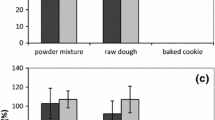Abstract
Milk and milk derivatives are common ingredients in food products. Undeclared milk is one of the leading causes of recalls in many countries, including the USA, and cases of allergic reactions have been reported due to unexpected exposures. There are commercial enzyme-linked immunosorbent assay (ELISA) kits available to the food industry to comply with the law by ensuring label accuracy and to identify potential sources of cross-contact. These kits are also used by regulatory agencies as part of their compliance programs. However, none of the commercial ELISAs for milk have been validated. Performance of ELISA kits for food allergens is affected by matrix, food processing, and stability and solubility of target proteins, among others factors. The performance of different commercial kits for milk allergens was evaluated by comparing a standard [National Institute of Standards and Technology (NIST) SRM #1549] spiked in wheat flour. We also compared the effect of food processing on detectability of milk proteins from incurred peanut butter cookies baked at various times. Kits differed in their ability to detect heat-treated milk proteins in baked cookies. Immunoblots clearly showed differences in antibody specificities and in their ability to detect proteins in processed foods. Factors such as undefined antibody specificity and differences in sample extraction solutions, materials used for calibrators, and reporting units contribute to variability of results among test kits and, hence, to increased uncertainty regarding the most appropriate use of the kits. Moreover, the use of incurred vs. spiked samples may affect protein recovery and, therefore, jeopardize the quantitative nature of the kit.


Similar content being viewed by others
References
Lee LA, Burks AW (2006) Food allergies: prevalence, molecular characterization, and treatment/prevention strategies. Annu Rev Nutr 26:539–565
Monaci L, Tregoat V, van Hengel AJ, Anklam E (2006) Milk allergens, their characteristics and their detection in food: a review. Eur Food Res Technol 223:149–179
Chapman M et al (2006) Food allergy: a practice parameter. Ann Allergy Asthma Immun 96(3 Suppl 2):S1–S68
Host A (2002) Frequency of cow’s milk allergy in childhood. Ann Allergy Asthma Immun 89(6 Suppl 1):33–37
Lee TT et al (2007) Contamination of probiotic preparations with milk allergens can cause anaphylaxis in children with cow's milk allergy. J Allergy Clin Immunol 119(3):746–747
Levin ME, Motala C, Lopata AL (2005) Anaphylaxis in a milk-allergic child after ingestion of soy formula cross-contaminated with cow’s milk protein. Pediatrics 116(5):1223–1225
Muraro A, Roberts G, Simons FE (2008) New visions for anaphylaxis: an iPAC summary and future trends. Pediatr Allergy Immunol 19(Suppl 19):40–50
Nowak-Wegrzyn A et al (2008) Tolerance to extensively heated milk in children with cow's milk allergy. J Allergy Clin Immunol 122(2):342–347 347 e1-2
Vila L, Beyer K, Jarvinen KM, Chatchatee P, Bardina L, Sampson HA (2001) Role of conformational and linear epitopes in the achievement of tolerance in cow’s milk allergy. Clin Exp Allergy 31(10):1599–1606
Author information
Authors and Affiliations
Corresponding author
Rights and permissions
About this article
Cite this article
Diaz-Amigo, C. Towards a Comprehensive Validation of ELISA Kits for Food Allergens. Case 2—Milk. Food Anal. Methods 3, 351–356 (2010). https://doi.org/10.1007/s12161-009-9095-y
Received:
Accepted:
Published:
Issue Date:
DOI: https://doi.org/10.1007/s12161-009-9095-y




